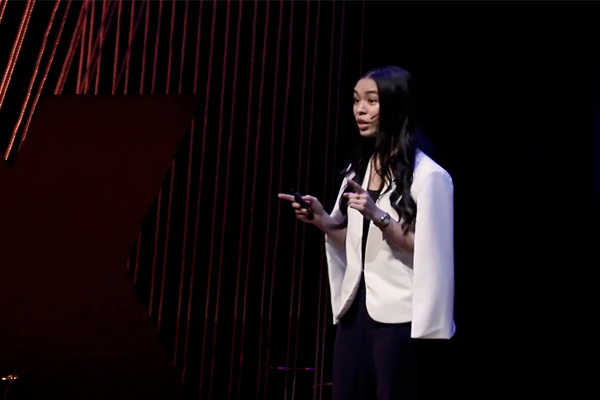In this exclusive interview, Fair Play Talks to Canada’s diversity champion Jessica Lui about equal opportunities for women, and untapping the potential of Generation Z and other under-represented groups. In this interview, the UN Ambassador, entrepreneurial founder and CEO, talks about mentorship for underrepresented groups and the secret to successful workplace diversity and inclusion. She also reflects on her coping mechanism for gender discrimination; and why we all deserve to work with “great leaders”.
FAIR PLAY TALKS: Why is mentorship important for under-represented groups, and how can businesses level that playing field?
Jessica Lui: That’s a question I’ve been asked quite a lot lately, particularly as there’s a rise in the understanding and need for diversity and inclusion. There’s a lot of research that shows workplaces that have a great diversity programme are usually ones that have continued engagement; and one really great way to do that is through mentorship. There’s a study that showed women and minorities are more likely to say that mentoring is an important part of their career. And so, it’s really important for organisations to have effective mentorship programmes if they want to recruit and retain diverse talent; and more mentors.
I think [mentoring] is a vital component to any career; that’s especially true if you’re part of a minority group. Whether that’s because of your age, gender, race, sexual orientation, whether you’re able bodied or disabled, mentors can really help you overcome some of the challenges that come from a lack of representation.
FAIR PLAY TALKS: What must businesses do to attract and retain talented, diverse employees?
Jessica Lui: I think companies need to recognise that both diversity and inclusion are really important to fostering an equitable workplace. I think the focus on inclusion is really what drives diversity. Does everyone feel comfortable bringing their full, authentic selves to work? Do they feel that they belong in the work environment?
When we think about how to set up diversity and inclusion programmes, I think there’s three things we need to keep in mind. The first is in our hiring process; is it fair and unbiased? Do we need to adjust the way that we search or screen for candidates?
The second is in education, whether that’s diversity training, options for managers or mentorship programmes that can help to grow diversity. I think the final piece, the most challenging piece, is culture. So if you’re an organisation that’s hired a diversity manager, they can do things like create a great grievance and complaint system if there are challenges with diversity; help support employee resource groups, for example, ‘Women in Leadership’, and so forth. Ultimately, I think the more inclusive environment you can create, the more diversity and the more diverse talent you’ll be able to retain.

FAIR PLAY TALKS: What can businesses do to support the development of their Gen Z employees?
Jessica Lui: I really feel for Generation Z. I think there’s this collective trauma that they’ve experienced over the past year; like the pandemic and the fact that young employees have often been laid off or furloughed during the pandemic. And others who are still in school have had a very tough transition. I think it’s important to recognise that learning has been disrupted in ways that many schools did not expect; nor were equipped to really handle.
I think the best thing we can do as companies is to support the transition between college and the professional world; and have a greater focus on that intergenerational mentoring and support. There are lots of different ways to do that; but I’ve noticed three really great things that a lot of companies are doing. The first is in their orientation programme. Orientation programmes used to be a short-term introduction to the workplace systems and other basics; but a more comprehensive approach is really helpful for [Generation Z].
That leads into my second point, which is some companies support younger generations through ongoing career support; and that can be intergenerational. And often, there’s benefits on both ends. Those younger employees who may be able to learn from others in the industry often have really great tech competencies. I’ve learnt far more about social media from my younger team members than I would know on my own; mentorship is really a two way street!
The final piece we can offer for young people is flexibility. They’re used to working online and setting their own schedule; so flexibility is something a lot of them are looking for. I think Generation Z brings quite a lot of resiliency and humanity to the workplace because they’ve been tested. There’s a lot of advantages to hiring some of those folks; and making sure we provide a structured support system that will smooth that transition into the workplace.
FAIR PLAY TALKS: As a young woman in business, did you ever experience discrimination from your older or male counterparts; and how did you overcome this?
Jessica Lui: So, this is a question that I get asked a lot, and I think it comes from a place of fear that you won’t be taken seriously for whatever reason, particularly from minority groups who have experienced discrimination. Maybe it’s because of your age, maybe it’s because of your gender, but my honest answer is: nothing. There’s nothing that I need to do differently from any other professional in my field to be taken seriously.
I think really great leaders are looking to invest in talent and potential regardless of gender and age. If someone feels I’m incapable on the sole basis of my age or gender because I’m a young woman, that’s not a person that I want to work with. I think everyone deserves to work with a great leader.”
FAIR PLAY TALKS: What was the biggest challenge you faced as an entrepreneur?
Jessica Lui: “Gosh, there’s always lots of challenges in entrepreneurship. I think the biggest challenge for me was building my brand; that’s true of many entrepreneurs. You have this absolutely crazy new idea; and you need to convince your investors, your mentors and your supporters that you can pull it off.
I think Jeff Bezos said it pretty succinctly, ‘entrepreneurs need to be willing to be misunderstood for a really long period of time’. That’s because the way that we see success today is not what success will look like in the future; particularly if you’re innovating.
Silicon Valley used to be a great place for fruit orchards, now it’s the heart of tech. Who knows what it will be in 50 years! And so I think entrepreneurship is really about seeing possibilities rather than problems when you face challenges. Really great companies are always created by people who want to solve a problem; and who are able to take that leap of faith.
MORE ABOUT JESSICA LUI
Jessica Lui is a UN Ambassador and the founding CEO of the Global Professional Practicum. She specialises in networking and mentoring, particularly for minority groups who are often underrepresented in the workplace. In recognition of her contributions, Lui was listed in Canada’s Top 30 Under 30 and Canada’s Top 100 Most Powerful Women, worthy accolades for such an influential figure.
As a speaker, Lui is renowned for her insight into entrepreneurship. From networking to equal opportunities, her speaking topics equip corporate audiences with the knowledge needed to transform their workplace culture. Jessica continues to set the standard for business at work; both on stage, online and via her company, the Global Professionals Practicum. She is among many top entrepreneurship speakers leading the equal opportunities revolution. She regularly attends corporate events to discuss the value diversity and inclusion bring to the workplace; and how business leaders can build an infrastructure of support for minority employees.
DIVERSITY CHAMPIONS
Check out our Movers & Shakers section, for more interviews with diversity champions. For example, read our recent interview with Hannah Chukwu, Assistant Editor at Penguin Random House UK, who talks about the challenges and opportunities for Black people and minorities in the publishing industry; and shares her passion for championing the voices of underrepresented authors worldwide.




































